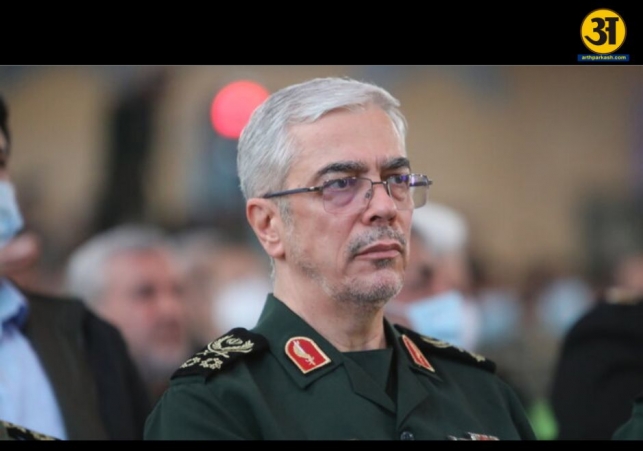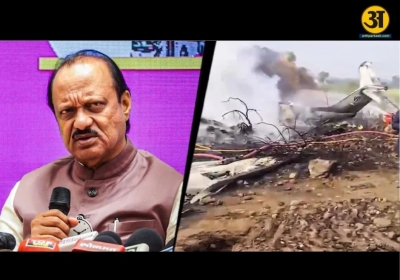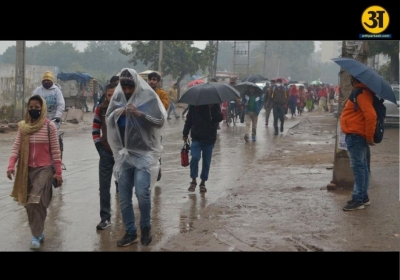
Iran’s top General Mohammad Bagheri killed in Israeli strike
Iran's Military Chief Mohammad Bagheri killed in Israeli airstrikes amid rising tensions
- By Gurmehar --
- Friday, 13 Jun, 2025
In a major and dangerous development, Israel carried out airstrikes on Friday that killed Iran’s top military officer, Major General Mohammad Bagheri. He was the Chief of Staff of the Iranian Armed Forces and one of the most powerful figures in Iran’s military system. The strikes also killed other senior leaders and hit several important Iranian military and nuclear sites.
These airstrikes have caused global shock and concern, with fears rising that this could lead to a larger war in the Middle East. Iran has promised retaliation. Many countries and the United Nations are now urging all sides to stay calm.
The attack and its impact
The Israeli airstrikes were described by international media as highly coordinated and strategic. They were aimed at key nuclear and military sites in Iran, including the Natanz uranium enrichment facility and the headquarters of the Islamic Revolutionary Guard Corps (IRGC) in Tehran. These strikes led to fires and explosions at several Iranian military bases.
Iranian state news outlets, such as the Tehran Times and Tasnim News Agency, confirmed the deaths of Bagheri and other senior officials, including Major General Hossein Salami, who was the head of the IRGC. The attack is being called one of the biggest hits to Iran’s military leadership in recent history.
The International Atomic Energy Agency (IAEA) has confirmed that one of Israel’s missiles did hit the Natanz nuclear site, which is crucial to Iran’s nuclear program. The IAEA also said they are closely watching the situation for any radiation risks or further dangers.
According to reports from the region, the IRGC headquarters in Tehran was also struck. Military buildings across the capital and other cities have also suffered damage due to the airstrikes. Iran has increased security and military alert levels, especially in the IRGC bases.
Who was Mohammad Bagheri?
Major General Mohammad Bagheri, whose full name was Mohammad-Hossein Afshordi, was one of the most senior military leaders in Iran. He had been head of the armed forces since 2016, a post that gave him control over Iran’s army, navy, air force, and the powerful IRGC.
Bagheri was a veteran of the Iran-Iraq War that took place from 1980 to 1988. He joined the IRGC in 1980, shortly after the 1979 Islamic Revolution, and quickly gained fame for his skills in military intelligence and operations.
He was also an educated man—he had a degree in engineering and later earned a Ph.D. in political geography. His strategies played a big role in Iran’s defense system and in shaping Iran’s modern military policy.
Analysts say Bagheri was part of a small, powerful group of IRGC commanders who are known as the "IRGC Command Network." This group has influenced Iran’s defense, foreign policy, and intelligence operations for decades.
Some reports suggest that Bagheri also took part in the 1979 U.S. embassy takeover in Tehran, where American diplomats were held hostage for 444 days. His brother, Hassan Bagheri, was also a senior commander and died in the Iran-Iraq war, making the Bagheri family deeply respected among Iran’s military and religious leaders.
Because of his long service and family history, Mohammad Bagheri was seen as a symbol of loyalty to the Islamic Republic and a key military brain of Iran.
ALSO READ: Ahmedabad Plane Crash Adds to Grim List of World’s Worst Air Disasters in Recent Years
Why the strike happened
The airstrikes happened during a period of rising tensions between Iran and Israel. Recently, both countries have accused each other of planning attacks. Israel has expressed serious concerns over Iran’s growing nuclear program and its support for armed groups like Hezbollah and Hamas.
Former U.S. President Donald Trump had warned earlier that a "massive conflict" might be coming in the Middle East. Israeli Prime Minister Benjamin Netanyahu later gave a televised speech saying that Israel had taken action to “neutralize imminent threats” from Iran.
Though the Israeli government did not officially name the people killed, it said the mission targeted important military centers and key command posts that were believed to be working on Iran’s nuclear weapons program and regional military planning.
This is not the first time Israel has carried out covert or direct operations against Iranian targets, but this time the attack was much larger and more openly aggressive, hitting both Iran’s nuclear and military centers at once.
The killing of top generals like Bagheri and Salami is being seen as a huge blow to Iran’s military power and pride. Iran’s government and people are in deep shock. State television aired emotional tributes to the generals and showed footage of angry citizens vowing revenge.
Iran’s Supreme Leader Ayatollah Ali Khamenei and President Ebrahim Raisi both issued strong statements. They said Iran will not remain silent and will strike back “at a time and place of its choosing.” Security forces across Iran have been put on high alert, and missile batteries and air defense systems are now ready in various cities.
Across the Middle East, many people are worried. In Lebanon, Syria, and Iraq, where Iran has strong allies and militias, there are concerns that a larger regional war may begin.
Global reaction
The world reacted with concern and alarm to the airstrikes and killings.
-
The United Nations called for restraint, warning that any further violence could lead to a full-scale war.
-
The European Union urged both Israel and Iran to stop any further military action and open channels for peace talks.
-
The United States said it was monitoring the situation closely and would work with allies to prevent a larger conflict.
Because of the rising tensions, global oil prices went up sharply on Friday. The Middle East is a key region for oil production, and any possible war could disrupt supply routes, affecting the global economy.
Financial markets across Asia and Europe also showed signs of instability, with investors worried about the future of the region and its impact on energy supplies.
Experts on Middle Eastern affairs say that Israel’s attack was both bold and dangerous. By directly targeting such senior military leaders, Israel has crossed a red line, and now Iran is under pressure to respond strongly.
Many believe Iran will not launch a full war immediately but may use proxy groups like Hezbollah in Lebanon or militias in Iraq and Syria to strike back at Israeli or allied interests.
Others fear that Iran may attempt cyberattacks, launch missile strikes, or even try to damage oil tankers or shipping routes in the Persian Gulf.
The next few days are expected to be very tense. Diplomats from Russia, China, the U.S., and Europe are reportedly working behind the scenes to stop the situation from getting worse.
This incident could mark a turning point in the region’s security. For years, Israel and Iran have been locked in a silent, shadow war—through cyberattacks, spies, and indirect attacks via other groups. But now, the war has come out in the open.
Killing generals of this rank is almost unheard of in modern times unless nations are officially at war. This means that we may be on the edge of a new Middle Eastern conflict, one that could involve several countries and affect millions of people.
If Iran retaliates, as promised, Israel is also likely to respond again—making this cycle of violence even harder to stop.
Many people around the world are hoping that diplomacy can stop a war before it begins. But with emotions running high in both Israel and Iran, and with two of Iran’s most important generals now dead, the path ahead looks very uncertain.





